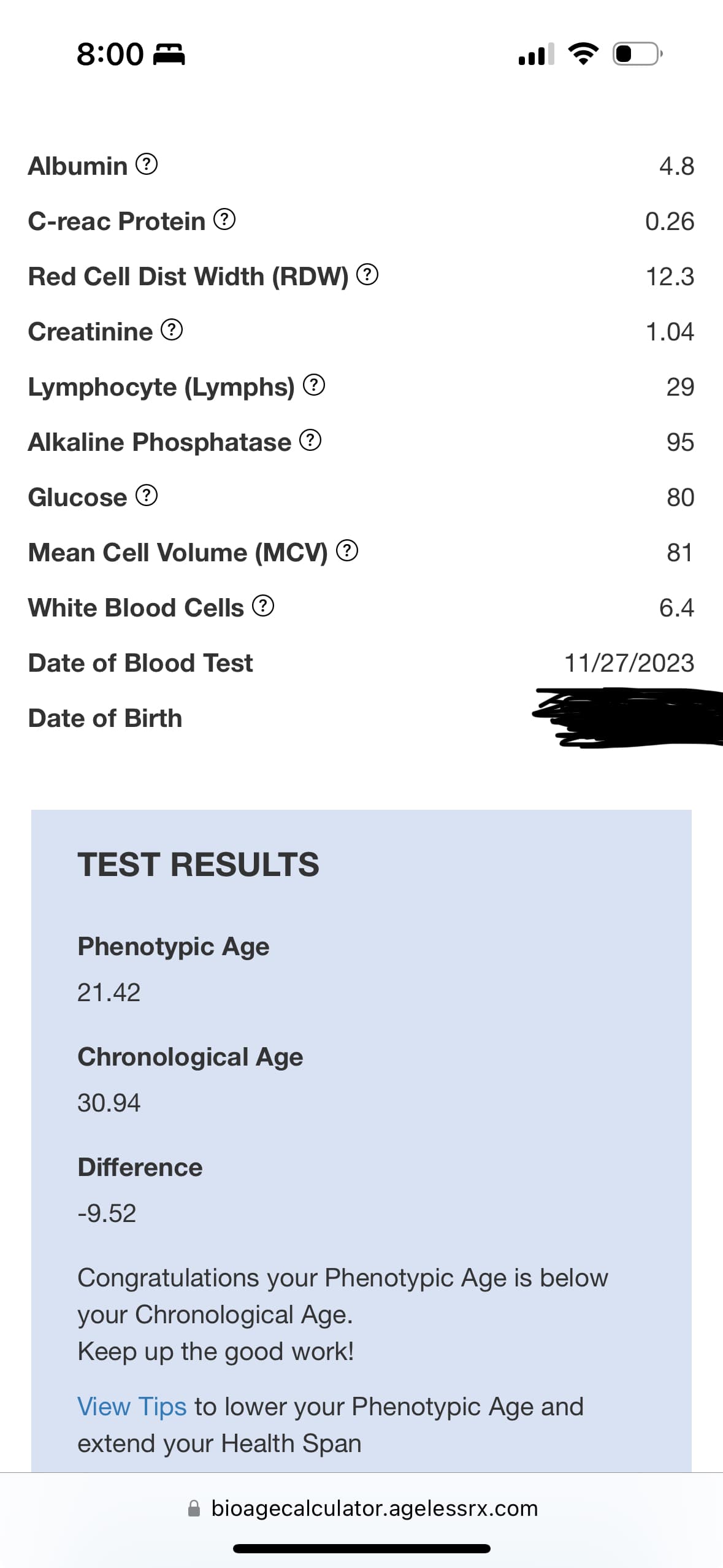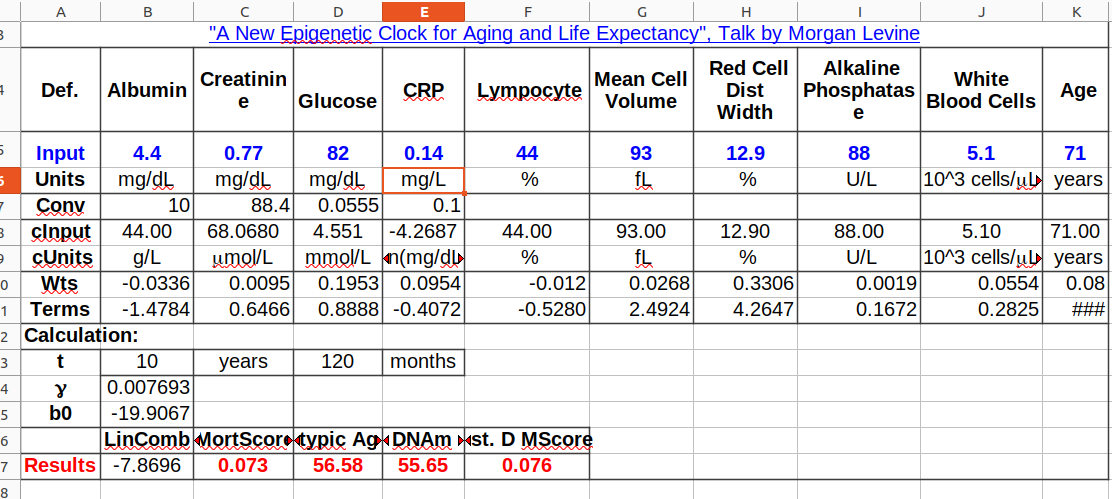There were also some epigentic age tests done in centenarians and discussed somewhere on the forum I think
I was reading Greger’s “How not to age” very large preview on Google Books where he said in the Epigenetics section that some 105-year old looks like a 60-year old in terms of methylation. (reference 604 of 13,000)
All these references are here: How Not to Age Citations
#604: Decreased epigenetic age of PBMCs from Italian semi-supercentenarians and their offspring - PubMed
( Decreased epigenetic age of PBMCs from Italian semi-supercentenarians and their offspring)
Thank you for the article! I reviewed the referenced publications and they have opposing data. Looks like many scientists have been investigating the centenarians biological ageing at this time which makes a lot of sense.
I would like to participate in the “friendly competition” for greatest age reduction. How will this be administered? Here in this public forum or offline?
Thanks,
Stephen
Hi, and welcome to the forums.
We haven’t had a ton of interest in this… so right now, just post your “pre and post” rapamycin treatment results in this thread, and see where you stand in the general results: Impressive Biological Age Reductions with Rapamycin (anecdotal)
Here are your Biological Age Results from Longevity Advantage:
Chronological Age: 55
Phenotypic Age: 38.03
Phenotypic Age vs. Chronological: -16.97
DNA MethylationAge: 37.69
DNAm Age vs. Chronological: -17.31
Very interesting website; thank you for accumulating and sharing all this wonderful information and experience! The above is my “before” state. I’m considering a short course of rapamycin to see if it helps with my perceived low energy levels. I’m roughly 30 pounds overweight, 6’3", male, moderately active, follow a “carnivore” lifestyle 95% of the time, and typically limit my meals to an 8-10 hour window. Until a year ago, I sauna bathed (180F) 5x weekly, but then I moved for work and haven’t built a new sauna yet. Seems like I might need to rather quickly! My HDL is 65, Trigylicerides 70, and LDL 130.
Wish me luck!
This is probably more correct:
Here are your Biological Age Results from Longevity Advantage:
Chronological Age: 55
Phenotypic Age: 43.63
Phenotypic Age vs. Chronological: -11.37
DNA MethylationAge: 43.17
DNAm Age vs. Chronological: -11.83
My C-reactive protein result is “<3.0”. I put 0.1 in the calculator originally, which likely is untrue. In this case I put 2.9. Blood tests was through Ulta; next time I’ll see if I can get an actual value.
I presume your CRP figure is measured in mg/dL. Be careful to put the right units into the calculator. The formula is based on data on a less sensitive CRP test as well.
Fifteen years off of my biological age (71-56). My first test a few months ago was 13yrs younger. I worked on my CRP which seemed like a heavily weighted item. Also it looks like albumin is heavily weighted but I couldn’t find any way to raise it other than consuming protein which I already do in abundance. For CRP, I think potassium citrate helped, also had a slightly lower creatinine. My red blood cell geometry has been below the lower reference range for more than a year, but apparently, somewhat below range is actually indicative of greater health. Until I found this out (on my own) I had been concerned about it. My PCP had just waved off my concerns.
I’ve been using rapa monthly 6mg+GF+KitchenSink, but skipped last dose due to dental work. I usually get ulcers. Other proven remedies I use are NAC/GLY (high dose), astaxanthin (100mg/day), ASA (81mg), acarbose (50mg x 2 per day), dapagliflozin (10mg), metformin SR (1g). And for decades now, during the winter, I will take a course of doxycycline or azithromycin just because it seems right, same for occasional fenbendazole, HCQ, and IVM.
I am not recommending any of this to anyone. In fact, I am specifically warning that it is reckless and potentially dangerous, so consult your physician, duh. And it’s not just the potential side effects and interactions, and mis-dosing. Another real hazard is that such poly-pharmacy makes a person essentially a pariah to the medical establishment and health insurance. To gain efficiency in cost, operation, and medical outcomes, they rely on standardized units. Realistically, with poly-pharmacy, there is no way they can effectively and hence ethically treat you. I would do the same if I were in their shoes, but I’m not. I’m just struggling to survive and prosper. Attached is the full lab report to show my bona fides. The names have been redacted to protect the guilty.
Oh my lipids look crazy good, check them out. I don’t know how to explain this to my PCP. I go in every year or two. He knows I’m taking a statin from decades ago, so I’ll just say that now I’m taking the statin regularly every day and that, plus prayer, great diet, sleep and exercise have done the rest. He might buy it, idk. That’s my story and I’m sticking to it.
Sept24redacted.pdf (1.2 MB)
Kudos to your excellent results. I see nothing wrong with your protocol.
How do you have so low lipids?
Although I was first prescribed statins decades ago, I would take them irregularly. I started thinking how most of the men in my family have died, and it’s CVD, so I had to get serious: so rosuvastatin 20mg, Ezetimide 10mg, B3 500mg. The LDL reading from 2 months ago came in at 78 after a month of steady 20mg Rosuvastatin, then I added the Ezetimide which got me to the present 40. It could be too low, although my understanding is that 20 is the danger zone, and I’m at 2x that, so idk.
Good watch-out, thank you.
Check out all the science Marion Holman links to on X. You’ll re-think your use of statins…
40 should be fine. My target zone is 30-50 for LDL and ApoB. For me, it is 48 for both when I use 5 mg Atorvastatin, Bempedoic Acid and Ezetemibe.
Over the past 30 years, I have been on and off statins perhaps a dozen times. I’ll be on them, then read what seems to be convincing negative evidence, so I’ll quit. Then a year or two later, I’ll read things that convince me they are a net positive, so I’ll start again, which is the current phase. I cannot swear, and indeed it is in fact likely (given my history) that I will change my mind yet again sometime in a year or two. So, as always, in the final analysis, IDK! (I just stumble through this foggy alien forest as best I can.)
The evidence in favor of statins is clear. You should look up the pyramid of evidence and ignore observational studies, ““expert”” opinions and anecdotes in favor of intervention trials and systematic reviews that all show a clear benefit of statins.
Or just go with Bempedoic Acid and Ezetemibe. No statin problems.
@DeStrider I agree, Especially for people who have known side effect with statins. Why suffer needlessly when other tools are available? No reasonable person says statins don’t lower apoB or that apoB doesn’t matter at all. But statins do have side effects as do all drugs. When the side effects are severe enough it is worth investigating other solutions.

